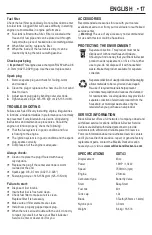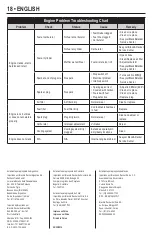
ENGLISH • 13
vigorous arm exercises during frequent work breaks
and also by not smoking.
l. Limit the hours of operation. Try to fill each day with
jobs where operating the brush cutter or other
handheld power equipment is not required.
m. If you experience discomfort, redness and swelling
of the fingers followed by whitening and loss of
feeling, consult your physician before further exposing
yourself to cold and vibration.
3. Power tool use and care
a. Store idle power tools out of the reach of children
and do not allow persons unfamiliar with the power
tool or these instructions to operate the power
tool.
Power tools are dangerous in the hands of
untrained users.
b. Maintain power tools. Check for misalignment
or binding of moving parts, breakage of parts
and any other condition that may affect the power
tools operation. If damaged, have the power tool
repaired before use. Many accidents are caused
by poorly maintained power tools.
c. Keep cutting tools sharp and clean. Properly
maintained cutting tools with sharp cutting edges are
less likely to bind and are easier to control.
d. Use the power tool, accessories and tool bits etc.,
in accordance with these instructions, taking
into account the working conditions and the
work to be performed. Use of the power tool for
operations different from those intended could result
in a hazardous situation.
4. Service
a. Have your power tool serviced by a qualified repair
person using only identical replacement parts.
This will ensure that the safety of the power tool is
maintained.
8. Labels on tool
The label on your tool may include the following
symbols:
ADDITIONAL WARNINGS
FOR GAS STRING TRIMMERS
f
Always wear eye protection: Wear safety spectacles
or goggles at all times when this tool is plugged in.
f
Guard: Do not use this tool without guard attached.
f
Dress properly: Do not wear loose clothing or jewelry.
They can be caught in moving parts. Rubber gloves
and substantial rubber soled footwear are recommended
when working outdoors. Don’t operate the tool when
barefoot or earing open sandals. Wear long pants to
protect your legs. Wear protective hair covering to
contain long hair.
f
Nylon line: Keep face, hands and feet clear
of rotating nylon line at all times.
f
La cuerda giratoria realiza una función de corte:
Tenga precaución al podar alrededor de pantallas
y plantas que desea.
f
Mantenga alejados a todos los trabajadores:
A una distancia segura, especialmente a los niños.
f
Important warning: When being used as an edger,
stones, pieces of metal and other objects can be
thrown out at high speed by the line. The tool and
guard are designed to reduce the danger.
f
Make sure that other persons and pets are at least
100 feet (30m) away.
f
To reduce the risk of rebound (ricochet) injury,
work going away from any nearby solid object
such as wall, steps, large stone, tree, etc. Use
great care when working close to solid objects and
where necessary, do edging or trimming by hand.
f
Avoid accidentally starting: Don’t carry plugged-in
tool with finger on trigger.
f
Do not force the tool: At a rate faster than the rate
at which it is able to cut effectively.
f
Use the right tool: Do not use this tool for any job
except that for which it is intended.
f
Don’t overreach: Keep proper footing and balance
at all times.
f
Damage to unit: If you strike or become entangled
with a foreign object, stop tool immediately, unplug,
check for damage and have any damage repaired
before further operation is attempted. Do not operate
with a broken hub or spool.
f
Avoid dangerous environmental conditions:
Do not use electric tools in damp or wet locations.
Follow all instructions in this instruction manual for proper
operation of your tool. Don’t use the tool in the rain.
f
Do not operate portable tools in gaseous or
explosive atmospheres: Motors in these tools
normally spark, and the sparks might ignite fumes.
f
Store idle tools indoors: When not in use, tools
should be stored indoors in a dry, locked-up place out
of reach of children.
Warning! and/or Danger! Precautions that involve your
safety.
Read instruction
manual
To reduce the risk of injury, user must
read and understand the instruction
manual.
Always wear eye and ear protection. Use a helmet.
Always use gloves
Always use boots
Risk of poisoning
Risk of fire or explosion
Hot surface
Risk of cut or hurt




































